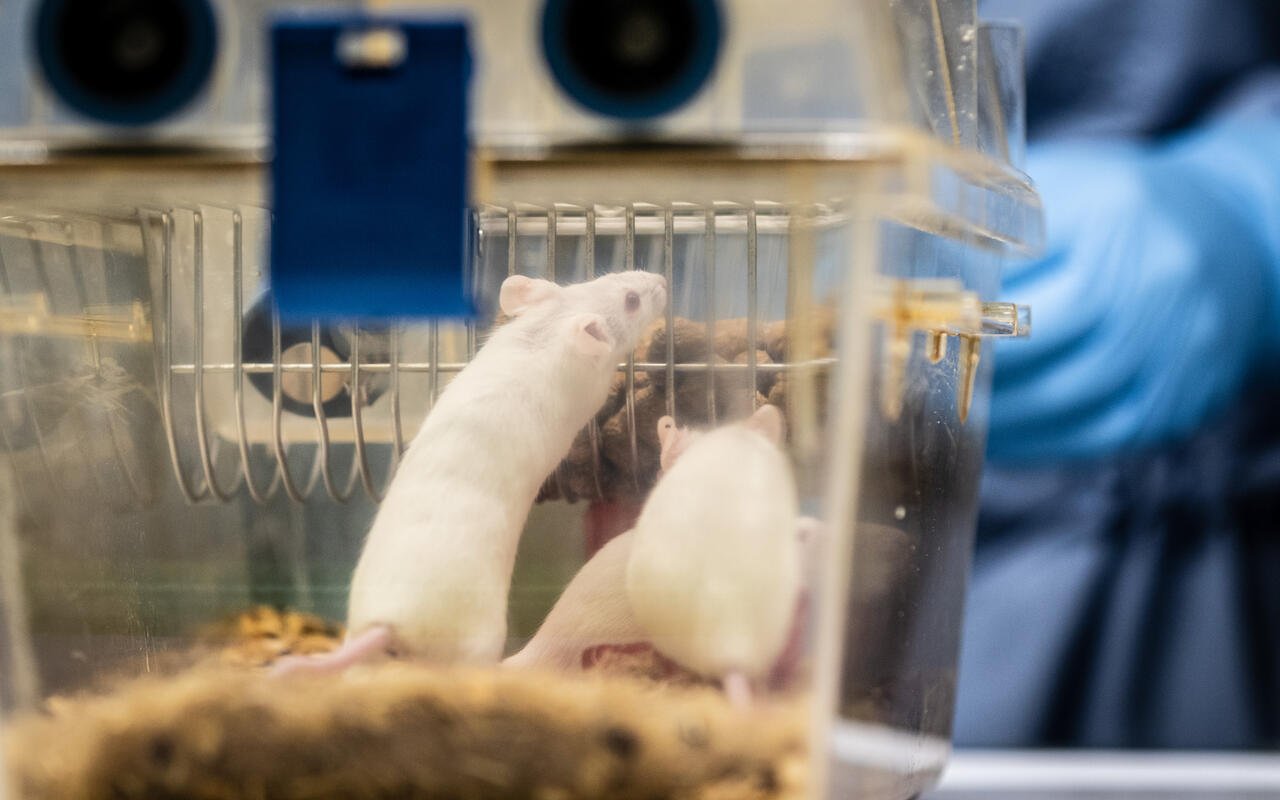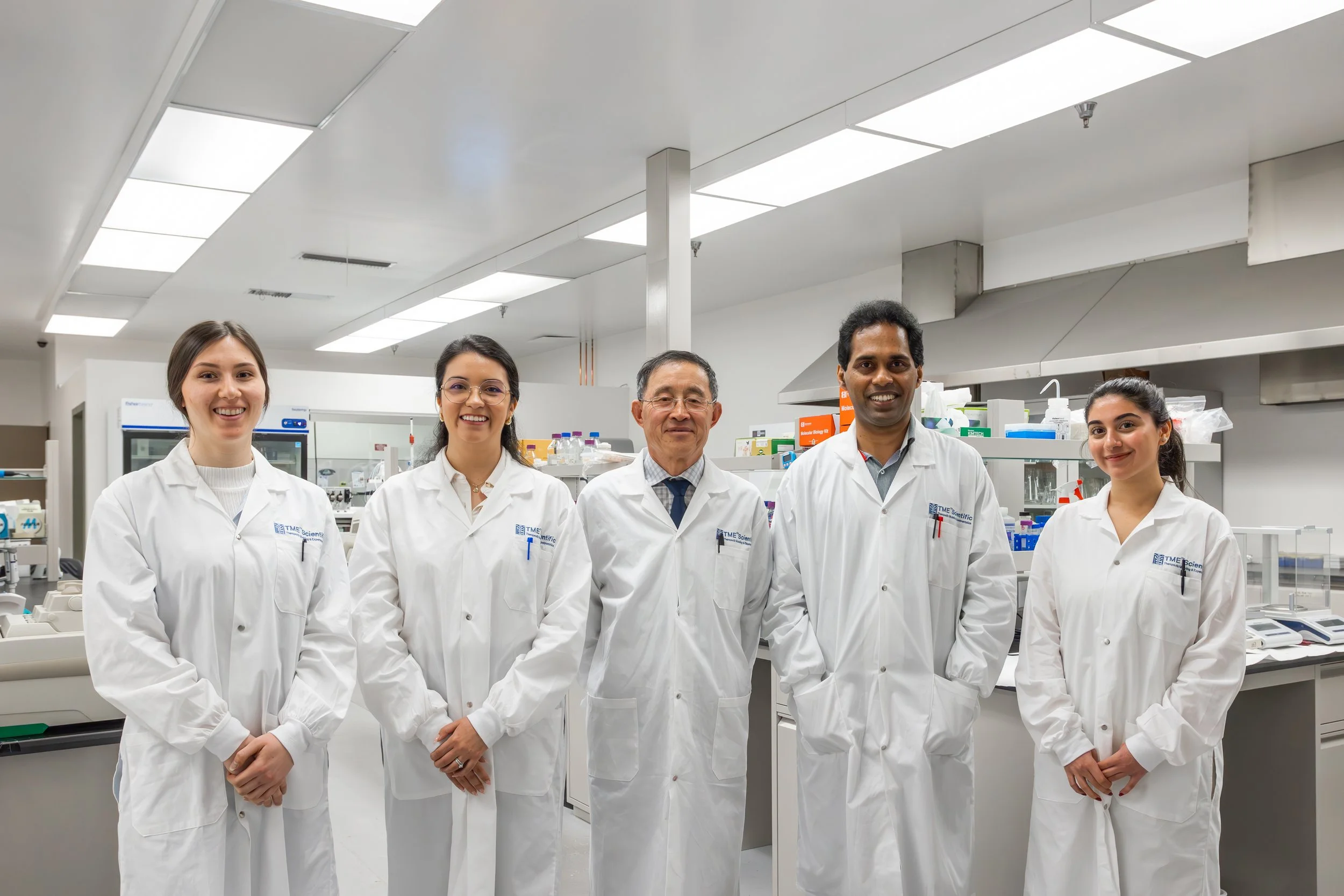Research Model Services
At TME Scientific, we provide comprehensive research model solutions to accelerate discovery and development across biomedical fields. Our in vivo animal models and associated services are designed to be flexible, timely, reliable, and fully customizable.
Our team combines deep scientific expertise with high-quality execution, empowering your research and supporting breakthroughs in disease understanding, drug development, and precision medicine. Each project is supported by a dedicated project manager and scientists who work closely with you to ensure scientific accuracy, timely communication, and tailored solutions that meet your research goals.

In Vivo
Animal Models
Cell Line-Derived Xenograft (CDX)
Human cancer cell lines are implanted into immunodeficient mice.
Experimental Applications: Efficacy evaluation, high-throughput drug screening, tumor growth inhibition.
| Name | Base Strain | Research Application |
|---|---|---|
| huHSC-NKG-hIL15 | NKG | Studies involving human immune and hematopoietic systems; supports CDX and PDX models using human-derived cells; used for investigating NK cell development, NK cell-targeted cancer immunotherapies, and ADCC mechanisms. |
Patient-Derived Xenograft (PDX)
Tumor tissue from cancer patients are implanted into immunodeficient mice, preserving tumor heterogeneity.
Experimental Applications: Efficacy and safety studies, biomarker discovery, personalized medicine.
| Name | Base Strain | Research Application |
|---|---|---|
| huHSC-NKG-hIL15 | NKG | Studies involving human immune and hematopoietic systems; supports CDX and PDX models using human-derived cells; used for investigating NK cell development, NK cell-targeted cancer immunotherapies, and ADCC mechanisms. |
Humanized Mouse Models
Immunodeficient mice are engrafted with functional human immune cells or tissues to mimic human immune responses.
Experimental Applications: Cancer vaccine development, cell/gene therapy, human-specific immunotherapeutics.
| Name | Base Strain | Research Application |
|---|---|---|
| B6-hFOLH1 (hPSMA) | C57BL/6Ntme | Targeted drug screening, design, and assessment focusing on FOLH1; investigation of disease mechanisms and treatments for hyperhomocysteinemia; study of underlying causes and therapies for various solid tumors including prostate cancer |
| B6-hLAG3 | C57BL/6Jtme | Drug screening and development targeting LAG3; exploration of pathological processes and therapeutic strategies for cancers such as melanoma, colorectal, and non-small cell lung cancer; research on chronic infectious diseases including HIV, hepatitis B, and tuberculosis; and autoimmune disorders like rheumatoid arthritis and Hashimoto’s thyroiditis |
| B6-hFAP | C57BL/6Ntme | Screening and evaluation of drugs targeting FAP; studies on disease mechanisms and treatment approaches for malignant tumors |
| H11-hB2M & HLA-A24 | C57BL/6Ntme | Investigation of human viral infections; development and validation of novel viral vaccines; evaluation of drug and vaccine safety and immune response; studies on cancer and autoimmune disorders; analysis of human immune cell-pathogen interactions; use of syngeneic tumor transplantation models |
| H11-hB2M & HLA-A2.1 | C57BL/6Ntme | Study of human viral diseases; creation and assessment of new viral vaccines; testing safety and immunogenicity of pharmaceuticals; research into cancer and autoimmune conditions; examination of immune cell and pathogen interactions; syngeneic tumor transplantation research |
| B6-hB2M & HLA-A2.1/mB2m KO | C57BL/6N;6Jtme | Development and testing of viral vaccines; evaluation of safety and immune responses to drugs and vaccines; studies on cancer and autoimmune disease mechanisms; investigation of human immune cell interactions with pathogens; research utilizing allogeneic tumor transplantation models |
| B6-hCRBN | C57BL/6Jtme | Screening, creation, and preclinical testing of CRBN-based targeted protein degradation therapies; investigation of pathological mechanisms and therapeutic options for autosomal recessive nonsyndromic intellectual disability; research on treatments and mechanisms of multiple myeloma and other blood cancers |
| BALB/c-hCRBN | BALB/cAntme | Development, screening, and preclinical testing of therapies focused on CRBN-mediated targeted protein degradation; study of disease mechanisms and treatments for autosomal recessive nonsyndromic intellectual disability; research into therapeutic strategies for multiple myeloma and other hematologic malignancies |
| B6-hKLB | C57BL/6Ntme | Drug screening and development aimed at KLB; studies of metabolic disorder mechanisms and treatments including obesity, diabetes, and metabolic-associated steatohepatitis; investigation of inflammatory diseases and select cancers |
| B6-hFGFR1c | C57BL/6Ntme | Screening, development, and preclinical testing of FGFR1c-targeted therapeutics; research on disease mechanisms and therapeutic approaches for cancers and metabolic disorders such as obesity, diabetes, and metabolic-associated steatohepatitis |
| B6-hBAFFR (hTNFRSF13C) | C57BL/6Ntme | Drug screening, design, and evaluation targeting TNFRSF13C; investigation of immune-mediated disorders such as common variable immunodeficiency (CVID), systemic lupus erythematosus (SLE), and Sjögren’s syndrome; study of disease mechanisms and treatments for certain B cell cancers |
| B6-hIL2RA | C57BL/6Ntme | Screening and development of drugs targeting IL2RA; research on autoimmune diseases including multiple sclerosis, type 1 diabetes, and rheumatoid arthritis; studies in tumor immunology and anti-cancer therapies |
| B6-hCD40 | C57BL/6Ntme | Targeted drug screening and development for CD40; investigation of disease processes and therapeutic options in cancers, autoimmune disorders, cardiovascular diseases, and neurological conditions |
| B6-hB7-H3 (hCD276) | C57BL/6Ntme | Screening and evaluation of CD276-targeted drugs; research on mechanisms and treatment strategies for solid tumors such as breast cancer, glioblastoma, and non-small cell lung cancer; studies in cancer immunotherapy |
| B6-hC5AR1 | C57BL/6Ntme | Development and screening of drugs targeting C5AR1; study of inflammatory and autoimmune diseases including psoriasis, rheumatoid arthritis, and inflammatory bowel disease; research on neuroinflammation related to Alzheimer’s disease and some cancers |
| B6-hTROP2 (hTACSTD2) | C57BL/6Ntme | Drug screening and development focusing on TACSTD2; investigation of pathological mechanisms and therapeutic approaches for various cancers; study of gelatinous drop-like corneal dystrophy |
| B6-hOX40L (hTNFSF4) | C57BL/6Ntme | Screening, development, and preclinical testing of TNFSF4-targeted therapies; research into pathological mechanisms and treatment options for autoimmune diseases like systemic lupus erythematosus (SLE) and rheumatoid arthritis (RA); studies in cancer immunology |
| B6-hCD40LG | C57BL/6Ntme | Development and preclinical evaluation of CD40LG-targeted drugs; research on autoimmune diseases including systemic lupus erythematosus (SLE) and lupus nephritis (LN); study of cardiovascular diseases and cancer |
| B6-hPCSK9 | C57BL/6Ntme | Development and screening of PCSK9-targeted therapies; preclinical pharmacology and efficacy studies; research on metabolic conditions such as hypercholesterolemia, atherosclerosis, and coronary heart disease; investigation of neurodegenerative disorders including stroke and Alzheimer’s disease |
| B6-hVEGFA/hANGPT2 | C57BL/6Jtme | Drug screening and development targeting VEGFA and ANGPT2; mechanistic studies on tumor development and cancer progression; research on vascular disease pathogenesis and autoimmune disorders |
| B6-hTL1A/hNLRP3 | C57BL/6N;6Jtme | Drug screening, development, and evaluation targeting TL1A and NLRP3; research into mechanisms and treatments for autoimmune and inflammation-associated diseases |
| B6-hIL12B | C57BL/6Ntme | Screening, development, and preclinical testing of IL12B-targeted drugs; study of immune-related disease mechanisms and therapeutic strategies as well as cancer research |
| B6-hCD20 | C57BL/6Ntme | Screening, development, and preclinical safety and efficacy evaluation of CD20-targeted therapies; research on disease mechanisms and treatments for autoimmune disorders and cancers |
| B6-hIL23A/hIL12B | C57BL/6Ntme | Drug screening, development, and assessment focused on IL23A and IL12B; investigation of pathological mechanisms and therapeutic approaches for immune-related diseases |
| B6-hCXCR2 | C57BL/6Ntme | Drug screening and development targeting CXCR2; research on the mechanisms and treatment of inflammatory diseases and cancers |
| B6-hIL4 | C57BL/6Ntme | Study of immune regulation and Th2 responses, allergic reactions, parasitic infections, and tumor immunology; preclinical development and screening of IL4-targeted therapies; investigation of inflammation and autoimmune diseases |
| Rosa26-hHRAS | C57BL/6Jtme | Rapid in vivo carcinogenicity testing for genotoxic and non-genotoxic compounds; investigation of HRAS oncogene mutations and their effects on tumor development |
| B6-hIL6 | C57BL/6Ntme | Research on autoimmune, inflammatory, cancerous, and infectious diseases; preclinical development, screening, and evaluation of IL6-targeted drugs |
| B6-hPD-1/hVEGFA | C57BL/6Jtme | Drug screening, efficacy testing, and safety evaluation focused on human PD-1 and VEGFA; research on tumor immunotherapy and immune system mechanisms |
| B6-hIgA1 | C57BL/6Ntme | Research on B cell maturation, antibody production, and autoimmune processes; construction and testing of IgA nephropathy (IgAN) models; preclinical evaluation of IgA1-targeted therapies |
| B6-hFGF21 | C57BL/6Ntme | Screening, development, and preclinical evaluation of drugs targeting FGF21; investigation of disease mechanisms and treatment strategies for metabolic disorders such as obesity, diabetes, and metabolic-associated steatohepatitis (MASH); study of cardiovascular diseases and cancer |
| B6-hSTING1 | C57BL/6Ntme | Drug screening, development, and evaluation focusing on STING1; research on autoimmune diseases; exploration of anti-cancer therapeutics |
| B6-hIL1A | C57BL/6Ntme | Drug screening and development targeting IL1A; study of pathological mechanisms and treatment approaches for conditions including rheumatoid arthritis, ankylosing spondylitis, chronic periodontitis, Alzheimer’s and vascular dementia, diabetes, systemic sclerosis, autoimmune encephalomyelitis, cerebral infarction; investigation of other chronic inflammatory, autoimmune diseases, and certain cancers |
| B6-hCD19 | C57BL/6Ntme | Research on B cell development and function; studies on autoimmune diseases such as systemic lupus erythematosus (SLE) and rheumatoid arthritis (RA), and B cell cancers; preclinical evaluation of anti-human CD19 CAR-T therapy, bispecific antibodies, and combination therapies; development and pharmacodynamic testing of CD19-targeted treatments |
| B6-hEGFR | C57BL/6Ntme | Drug screening, development, and evaluation targeting EGFR; study of disease mechanisms and therapies for various cancers including non-small cell lung cancer (adenocarcinoma), glioblastoma, colorectal cancer, and breast cancer |
| B6-h4-1BB (TNFRSF9) | C57BL/6Ntme | Research on cancer immunotherapy and autoimmune conditions; preclinical development, screening, and evaluation of 4-1BB agonists |
| B6-h4-1BB/hPDL1 | C57BL/6N;6Jtme | Screening, development, and evaluation of drugs targeting 4-1BB and PD-L1; investigation of cancer immunotherapy mechanisms and treatments |
| B6-hIL6RA | C57BL/6Ntme | Research on autoimmune, inflammatory, cancerous, and infectious diseases; preclinical drug development, screening, and evaluation focused on IL6RA |
| B6-hIL6/IL6RA | C57BL/6Ntme | Investigation of autoimmune, inflammation-related, cancer, and infectious diseases; preclinical studies for development, screening, and testing of drugs targeting IL6 and IL6RA |
| B6-hPDL1-V | C57BL/6Ntme | Development and screening of PD-L1-targeted therapeutics; evaluation of drug efficacy and safety; research on tumor immunotherapy and mechanisms of immune evasion |
| hCldn18.2 | C57BL/6Ntme | Development and screening of therapies targeting CLDN18.2; assessment of efficacy and safety for CLDN18.2-targeted treatments; investigation of digestive tract malignancies |
| B6-hCTLA4 | C57BL/6Ntme | Development and screening of CTLA4-targeted inhibitors and antibody drugs; evaluation of therapeutic efficacy and safety; research on tumor immunotherapy and immune system mechanisms; studies on autoimmune diseases |
| hPdcd1 (hPD-1) | C57BL/6Jtme | Development and screening of PD-1-targeted therapies; efficacy and safety assessment; evaluation of tumor immunotherapy approaches; research on immune system function and tumor immune evasion mechanisms |
| B6-hPD-1/hPD-L1 | C57BL/6tme | Screening, development, and evaluation of PD-1/PD-L1-targeted drugs; studies on the pathological mechanisms and treatment strategies for cancer immunotherapy |
| B6-hGDF15 | C57BL/6Jtme | Research on cardiovascular conditions such as heart disease; studies of metabolic disorders including diabetes and anorexia; investigation of colorectal, prostate, and other cancers; preclinical evaluation of GDF15-targeted drugs |
| Cd11b-hCD89 (FCAR) | C57BL/6Ntme | Research on immune response and autoimmune processes; development and evaluation of IgA nephropathy (IgAN) models; preclinical testing of CD89-targeted therapies; studies on tumors and infectious diseases |
| B6-hIGF1R | C57BL/6Ntme | Screening, development, and evaluation of IGF1R-targeted drugs; study of mechanisms and treatments for thyroid eye disease (TED); investigation of pathological mechanisms and therapies for growth retardation, diabetes, and cancer |
| BALB/c-hIGF1R | BALB/cAntme | Screening and development of IGF1R-targeted therapies; research on mechanisms and treatment of thyroid eye disease (TED); studies on growth retardation, diabetes, and cancer |
| B6-hPD-1/hCTLA4 | C57BL/6Ntme | Drug screening, development, and evaluation targeting PD-1 and CTLA4; investigation of pathological mechanisms and therapeutic approaches for cancers and chronic viral infections |
| B6-hBAFF (hTNFSF13B) | C57BL/6Ntme | Drug screening, development, and evaluation focusing on BAFF; studies on pathological mechanisms and treatment of autoimmune diseases and specific B cell cancers |
| B6-hBCMA (hTNFRSF17) | C57BL/6Ntme | Screening, development, and evaluation of BCMA-targeted therapies; investigation of pathological mechanisms and treatment strategies for multiple myeloma, systemic lupus erythematosus, and B cell-associated disorders |
| B6-hIL1RAP | C57BL/6Ntme | Drug screening, development, and evaluation focused on IL1RAP; research on mechanisms and therapies for cancer and inflammatory conditions |
| B6-hIL1RL1 (hIL33R) | C57BL/6Ntme | Screening, development, and evaluation of IL1RL1-targeted drugs; studies on pathological processes and treatment options for cancer, inflammation, and immune-related diseases |
| B6-hIL7R | C57BL/6Ntme | Targeted drug screening and development for IL7R; research into pathological mechanisms and therapies for autoimmune disorders, immunodeficiency, and cancer |
| B6-hITGA4 | C57BL/6Ntme | Drug screening, development, and evaluation targeting ITGA4; research on pathological mechanisms and treatment of inflammatory and autoimmune diseases |
| B6-hITGB7 | C57BL/6Ntme | Screening and development of ITGB7-targeted therapies; investigation of inflammatory and autoimmune disease mechanisms and therapeutic strategies |
| B6-hα4β7 | C57BL/6Ntme | Targeted drug development and evaluation focused on α4β7; research into pathological mechanisms and treatment of inflammatory and autoimmune diseases |
| B6-hHER2 (hERBB2) | C57BL/6Ntme | Screening, development, and evaluation of HER2-targeted therapies; research on pathological mechanisms and treatment strategies for HER2-positive cancers |
| B6-hIL4RA | C57BL/6Ntme | Investigation of immune regulation involving Th2 responses, allergic and parasitic diseases, and tumor immunology; preclinical development and evaluation of IL-4Rα-targeted treatments; studies on inflammation and autoimmune disorders |
| huHSC-NKG | NKG | Long-term studies on tumor immunity, hematopoiesis, and gene therapy applications in hematologic and infectious diseases |
| huPBMC-NKG | NKG | Short-term investigations involving mature T cells focused on tumor immunity, hematopoiesis, and gene therapy for blood and infectious diseases |
| huHSC-NKG-hIL15 | NKG | Studies on human immune and hematopoietic systems; modeling using human cell line xenografts (CDX) and patient-derived xenografts (PDX); exploration of NK cell development, tumor immunotherapy leveraging NK cells, and antibody-dependent cellular cytotoxicity (ADCC) mechanisms |
Syngeneic Models
Mouse tumor cells are implanted into genetically identical immunocompetent mice.
- Wild-Type: Standard mouse strains
- Transgenic: Genetically modified mice expressing specific genes
Experimental Applications: Efficacy studies, tumor-immune interaction research, immuno-oncology.
| Name | Base Strain | Research Application |
|---|---|---|
| H11-hB2M & HLA-A24 | C57BL/6Ntme | Investigation of human viral infections; evaluation of new viral vaccines; assessment of drug and vaccine safety and immunogenicity; studies in oncology and autoimmune disorders; analysis of human immune–pathogen interactions; and syngeneic tumor transplantation research. |
| H11-hB2M & HLA-A2.1 | C57BL/6Ntme | Research on human viral infections and vaccine development; preclinical evaluation of drug and vaccine safety and immune response; studies in cancer and autoimmune diseases; investigation of human immune cell–pathogen interactions; and syngeneic tumor model research. |
| H11-hB2M & HLA-A11 | C57BL/6Ntme | Exploration of human viral infectious diseases; design and evaluation of next-generation viral vaccines; testing the safety and immune responses of therapeutics and vaccines; investigations in oncology and autoimmune conditions; analysis of interactions between human immune cells and pathogens; and studies using syngeneic tumor transplantation models. |
Disease Models
Preclinical models designed to mimic long-term disease progression in metabolic, fibrotic, and inflammatory disorders.
| Name | Base Strain | Research Application |
|---|---|---|
| B6-hLAG3 | C57BL/6Jtme | Development and evaluation of LAG3-targeted therapies; studies on cancers such as melanoma, colorectal, and non-small cell lung cancer; investigation of chronic infections (e.g., HIV, hepatitis B, tuberculosis); autoimmune disease research. |
| B6-hIL1A | C57BL/6Ntme | Screening and development of IL1A-targeted drugs; investigation of diseases such as rheumatoid arthritis, Alzheimer’s, diabetes, systemic sclerosis, and cerebral infarction; research into chronic inflammatory diseases, autoimmune, and select cancer pathways. |
| B6-hPD-1/hCTLA4 | C57BL/6Ntme | Evaluation of PD-1/CTLA4-targeted therapies; research on cancer immunotherapy and chronic viral infection mechanisms. |
Customized Models
We develop fully customized mouse and rat models tailored to your research needs, whether it's a specific genetic modification, pathway alteration, or disease phenotype. Our team collaborates closely with you to design and deliver models that meet your experimental goals.
Experimental Applications:
Tailored disease modelling, target validation, therapeutic screening, mechanistic studies, and translational research across oncology, immunology, metabolism, and more.
Interested in building a model for your study?
Contact us to discuss your project and explore custom development options.
Genetically Engineered Mouse (GEM) Models
Mice are modified to carry specific genetic alterations—such as knockouts, knock-ins, or transgenes—to mimic human disease mechanisms at the molecular level.
Experimental Applications:
Target validation, mechanistic studies, disease progression modeling, therapeutic evaluation, and biomarker discovery.
| Name | Base Strain | Research Application |
|---|---|---|
| H11-hB2M & HLA-A24 | C57BL/6Ntme | Viral infection modeling, vaccine testing, immunogenicity profiling, cancer and autoimmune research using syngeneic tumors. |
| H11-hB2M & HLA-A2.1 | C57BL/6Ntme | Studies on viral immunity, preclinical vaccine safety, and immuno-oncology applications. |
| H11-hB2M & HLA-A11 | C57BL/6Ntme | Designed for testing vaccines, immunotherapies, and tumor transplantation in humanized immune backgrounds. |
| C57BL/6Jtme-Gemem1/tme | C57BL/6Jtme | Functional genomics model for studying GEM on chromosome 4. |
| C57BL/6Jtme-Gemem1flox/tme | C57BL/6Jtme | Conditional GEM knockout for spatial/temporal gene function analysis. |
| C57BL/6Jtme-Gmnnem1/tme | C57BL/6Jtme | Gmnn knockout for chromosome 13 gene function studies. |
| C57BL/6Jtme-Gmnnem1flox/tme | C57BL/6Jtme | Conditional model for tissue-specific Gmnn studies. |
| C57BL/6Jtme-Smn1em1/tme | C57BL/6Jtme | Smn1 knockout for modeling spinal muscular atrophy. |
| C57BL/6Jtme-Smn1em1flox/tme | C57BL/6Jtme | Conditional SMA model for neurogenetic disorder studies. |
| B6-3*hSMN2 | C57BL/6Jtme | SMA model with 3 human SMN2 copies for moderate disease phenotype studies. |
| B6-4*hSMN2 | C57BL/6Jtme | SMA model with 4 SMN2 copies mimicking milder disease. |
| B6-hSMN2 (SMA) | C57BL/6Jtme | Severe SMA model with only human SMN2 gene, useful for subtype simulation. |
| C57BL/6Jtme-Ddx20em1/tme | C57BL/6Jtme | Germline knockout for RNA splicing and cell differentiation. |
| C57BL/6Jtme-Ddx20em1flox/tme | C57BL/6Jtme | Conditional knockout for RNA regulatory studies. |
| C57BL/6Jtme-Gmncem1flox/tme | C57BL/6Jtme | Conditional Gmnc model for epithelial cell biology. |
| C57BL/6Jtme-Gemin2em1flox/tme | C57BL/6Jtme | Gemin2 floxed model for neurodevelopmental gene function studies. |
| C57BL/6Jtme-Gemin5em1/tme | C57BL/6Jtme | Germline knockout for translational regulation studies. |
| C57BL/6Jtme-Gemin5em1flox/tme | C57BL/6Jtme | Conditional version for localized gene inactivation. |
| C57BL/6Jtme-Gemin6em1/tme | C57BL/6Jtme | Knockout model for snRNP-associated functions. |
| C57BL/6Jtme-Gemin6em1flox/tme | C57BL/6Jtme | Conditional model to assess gene role in neuromuscular systems. |
| C57BL/6Jtme-Gemin7em1/tme | C57BL/6Jtme | Germline knockout for spliceosomal studies. |
| C57BL/6Jtme-Gemin7em1flox/tme | C57BL/6Jtme | Conditional knockout for studying tissue-specific splicing roles. |
| C57BL/6Jtme-Gemin8em1/tme | C57BL/6Jtme | Used in studies on neuromuscular disorders and RNA-binding proteins. |
| C57BL/6Jtme-Gemin8em1flox/tme | C57BL/6Jtme | Conditional knockout for targeted SMA pathway analysis. |
We specialize in the development of customized mouse and rat models that closely mimic human disease. With extensive experience in CDX, PDX, syngeneic (wild-type and transgenic), and humanized models, we support a wide range of research areas including oncology, immunology, and infectious disease.
In addition to custom model generation, we also offer a catalog of ready-to-use mouse models available for immediate purchase — optimized for high reliability, fast turnaround, and translational relevance.
Below are some examples of the models we offer.
Need More Than Mouse and Rat Models?
Through our network of GLP- and AAALAC-certified partners, we offer in vivo study support across a wide range of species – including zebrafish, rabbit, minipig, beagle dog, and non-human primates (including rhesus and cynomolgus monkeys). These models enable more predictive pharmacology and translational research.
With deep pharmacodynamics expertise and a broad library of validated disease models, our partners support everything from early target and compound evaluation to IND-enabling studies.
Ready to take your preclinical studies further? View our Partner Services.






